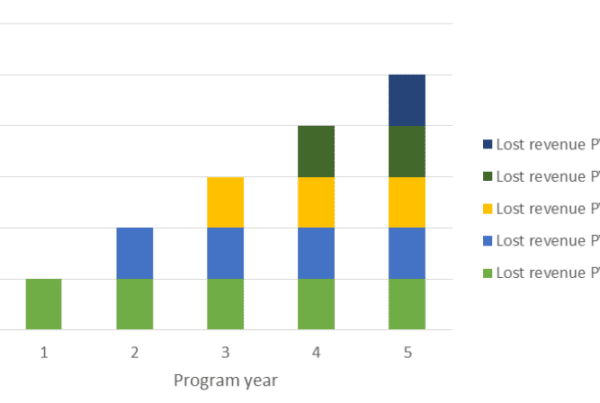It has been quite a year for protests. From Glenn Beck (although he swears it wasn’t a protest) and Jon Stewart (ditto) taking up the entire National Mall in Washington, to the months long battle royale in the 85 square miles surrounded by reality – also known as Madison, WI. For what it’s worth, you can check out the spin in both directions regarding the recent jobs report and Wisconsin. More time is needed to draw any conclusions.
The primary problem of course in all these cases, including the greased pig wrasslin match in Washington in recent weeks, is governments have long been making promises that are going to have to be broken. But it isn’t only the government. See General Motors and Chrysler. Come to think of it, these once great companies are essentially an arm of the federal government despite the cooked books that say otherwise.
Many proposals for services in our business for program implementation or evaluation take many hours, from maybe 40 for providing technical support to five or ten times that much for program implementation or large portfolio evaluation projects. On top of this, pile possibly another 100 hours on to prepare for and provide a dog and pony show, or maybe only half that for an interview, which is what I prefer. I like answering questions in an interview-type process. I don’t like spewing repackaged stuff from the proposal.
On top of this, add the fact that the people involved with these proposals are expensive – project managers, principals, and directors that fetch $150-$200 per hour. Do the math and you have tens of thousands of dollars to produce a proposal and typically there are four or six bidders. In aggregate, a huge amount of money is spent pursuing significant projects.
Unfortunately, we do not win everything we bid, although we can certainly improve our odds in a number of ways; one of which is to pursue only RFPs that seem to be written for us. Another is to be on a carefully selected team of partnering companies.
When we do not win, we are very interested to know why. We really appreciate useful feedback from the buyer, especially if we thought we should have won. Unfortunately, from the buyers’ perspective, there is nothing in it for them to help us. Anything they say can and will be used against them in a court of law, they may think – not really (at all), especially in our case. There is also no benefit to us for crying and whining about whatever feedback they provide. Buyers, please take note of this. We will not complain.
However, in today’s litigious state of the nation I can understand them saying practically nothing – like you don’t dare provide any comments about a past employee for fear of recrimination, defamation, discrimination, and a bunch of other t-i-o-n zzzz.
While we desire to find out all we can and as truthfully as can be afforded, some losers (in more than one way) file a formal protest. What is the purpose of this, other than reinforcing buyers’ general reluctance to help us and others who want to learn of their perceived weaknesses?
The only thing you get in protest is a bad name – whiner, the-dog-ate-our-proposal sore LOSER. What would you expect the buyer to do? “Gee, you know, you have a point. I’m going to call the team we selected and tell them the bad news – that we decided to hire you losers because you whined and we are all about making whiners happy.”
Consider the possibilities:
- Some portion of the RFP wasn’t clear or something conflicted. Well so it is for everyone.
- The other team had an unfair advantage because [I have no idea what]. This goes nowhere.
- The wife of the CEO from the winning team plays golf with a woman who works for a company that is a provider of something to a different company that that used to be part of yet another company that gave a ton of campaign money to the second uncle of the governor’s second of four wives, in 1986. Conflict of interest!
- The buyer would have to admit a really, really egregious mistake or malfeasance or there would have to be proven collusion or direct kickbacks – like criminal stuff to change its mind, deselect and select someone else, and then the loser wouldn’t be chosen anyway.
So what is the point, other than making a hassle for the buyer and bogging down the entire process? Will this improve the protestor’s odds next time? No chance. This is a scorched earth tactic that harms, or at minimum wastes everyone’s time. This is 180 degrees, pi radians, half revolution, and direct opposite of our aspiration of doing business – that is, everyone involved – buyer, seller, stakeholders – with a project wins.
Tidbits
Speaking of collusion, this happens perfectly legally and fairly all the time in our business. If Company A is afraid to compete with Company B for fear of losing to them, they team together. However, as a client once said, you need to look out who you team with because teaming with Company B and winning is like bidding the project on our own and losing.
I used to have a poster of “Peter’s Laws” that was akin but opposite Murphy’s Laws – you know, anything that can go wrong will go wrong. Two pertinent Peter’s Laws that are burned in my brain:
- If you can’t beat them, join them, and then beat them. Company B practices this business model, and trust me, it happens with other companies as well. In fact, we were even dropped from a project after we helped the dirt bags win the project. This is horrible business practice and they are obviously black listed from our base.
- The squeaky wheel gets replaced. Take note protestor.





